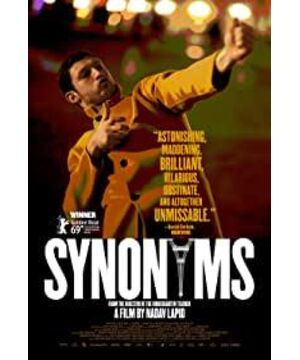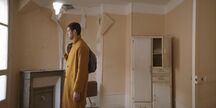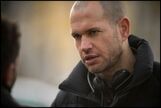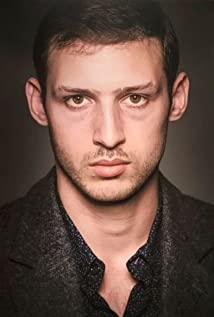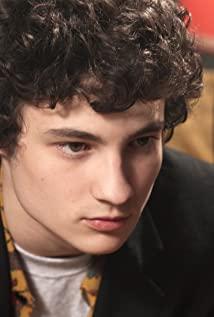(The abridged version of this article was first published on Wei'er WeChat public account)
"Synonyms" is difficult to understand, the scene is independent, and the plot is absurd, which forms a huge obstacle to watching the movie. Its obvious connotation points to identity, and even Europe's current refugee problem: how much do you have to give up to squeeze into that lofty culture?
However, this article does not discuss these at the macro level, but wants to provide another viewing angle: focus on the ambiguity of the language of the camera, and not regard "Synonyms" as a narrative from a third perspective, but as an imaginative subjective text. It is by no means a ramble on an antecedent theme (whether immigration or cultural conflict). When the audience sees Joyav's story simply as an escape from a wall and a critique of "the hypocrisy of civilized society", it is in fact just a marionette. The central setting of the film is that Yoav is a person who is extremely gifted and sensitive to words. He can use unfamiliar words to organize stories with imagery, emotion, and power, while the novelist Emile is drowning in words, writing clichés, words that are lifeless in his hands.
The film uses a lot of subjective third-person perspective, with the camera staggering to follow Yoav, now following his long legs, and now scrambling across the street scene over his shoulder. This, of course, conveys the curiosity and impulsiveness of my heart when I first arrived in Paris and started to speak French. But more details seem to allow for a more subjective interpretation. The film opens with Yoav entering a large, empty house. Why is the big house empty? When he came out of the bathroom and fell in a comically exaggerated pose, was it really that way, or was the scene already a literary exaggeration? Let us imagine that Joseph, in writing, or in recollection, is like a ghost buried in a big house, quietly observing the panic and ugly state of the body called "self".
In several meetings by the Seine River, the two sides walked into the picture rigidly, the camera stayed rigidly on the side, and people came and went. A strong sense of stage suggests a peeping perspective.
Do Emile and Caroline exist? Or is it Yoav's imagination? Imagine them young, beautiful, compassionate, and elegant. Imagine one of them lacking creativity because they haven't been beaten by society, and one of them is full of desire and can have a passion anytime, anywhere. Emile and Caroline - France - are nothing but the projection of Yoav's desires. At the beginning of the film, Yoav is naked in the bathtub, just like "The Death of Mara". Emile and Caroline show up and rescue him. Is this a new life, or the starting point of imagination? Since then, the uniformed Israeli embassy staff and the voluptuous nightclub girls have all been profiled. As Yoav crawled towards us in the lavish nightclub crowd, it was as if he was crawling towards the audience on the stage, interacting with us.
The oscillating lens between subjective and objective perspectives no longer points to a provocation of the viewer's gaze. It greets us into a literary world that is difficult to distinguish between true and false. Yoav has been telling stories, taking the initiative to tell stories. It doesn't matter who you tell it to, you just need to have an audience when you tell it about it, even if you imagine one. This is how the film gradually progresses from the trivial skin of tomato bolognese to one ritual after another: filming pornographic videos, a ritual of voyeurism; taking a compulsory immigrant class: a ritual of building a community; concert: a ritual of cleansing... Obscene and elegant are synonymous . Hate and love are synonymous. Israel and France are synonymous.
Towards the end, Yoav passes Notre Dame again, and the surroundings are still empty. He looks up, and the camera pans slyly around him, framing Notre Dame so high that it looks like it's going to fall straight down in the next second. Then suddenly cut to the big panorama, Yoav as small as an ant. Such breaks are found throughout the film. The dislocation between the objective perspective and the subjective perspective that cannot find the subject makes the meaning float, and the viewer has to start thinking in this floating, because he cannot substitute for Joyaf, nor can he simply substitute for the passer-by. He could not substitute for a definite subject, and had to float around with every shot and every situation.
Said summed up Orientalism by quoting Marx's words "they cannot express themselves, they must be expressed" in the opening chapter of "Orientalism": the "Oriental" is regarded as a static body without the flow of time and space, rigid in the West to its becomes "Eastern" in the expression. The situation constructed by "Synonyms" is that outsiders actively express themselves in a foreign language, trying to establish a new self. The film seems to give the impression that, as the foreign words continue to eat away at the native language, Yoyav's self-identity gradually dissolves until it collapses. However, if the subject is already empty, naturally there is no way to dissolve it.
When Joyaf uses a barrage of derogatory terms to describe Israel, we cannot tell whether Joyaf learned the words through constructed sentences or whether he expressed his experience of Israel in the learned words. But we don't have to tell the difference. To learn a language is to construct oneself in a system of symbols. A barrage of synonyms forms a drifting chain of signifiers. Each synonym constitutes a signifier, and their relationship is not determined by a subject "Israel", or "France". Rather, an arbitrary order between the signifiers constitutes "Israel" or "France." There is no France or Israel as an invariant subject to accept these synonyms. Yoav simply replaced the Hebrew signifier chain with the French signifier chain, the France he desires does not exist, and he is at a loss. He has to constantly walk the streets of Paris (or anywhere), spitting out a string of synonyms, constantly deconstructing, constantly constructing, and repeating, there is no way to escape.
In the section of the filming of a pornographic video, the filmmakers were asked to describe their feelings in their native language. The resolute French-speaking Yoav had no choice but to bow his head to the capital and howl in Hebrew. Viewers of such videos expect real responses rather than performances, projecting desire onto the flesh of exotic men. Yoav seems to be the object of desire, but in fact he is only a link in the chain of signifiers.
On the surface, Israel is a civilization that "gives civilization time", while France is a civilization that "gives time to civilization". In fact, there is no essential difference between the two civilizations. It is not that France is "bad" because French society rejects Joyav. Realistically speaking, even if Yoyav can only say two words "hello" and "goodbye", it is possible to be a kebab brother or something, and enter the harmony of passers-by meeting and greeting each other. The core of Yoav's wandering is that what he cannot accept is not only compulsory military service, but life as a link in a symbolic system. He pursues beyond the fashionable concepts of "freedom", "romance" or "left bank", and touches upon the possibilities that spill out of it. He fought against it with his body (strong collision) and heart (literary creation), fighting all the way.
Of course, we can regard the door knocking at the end of Joyav as his aphasia, forced to return to the power of the body due to aphasia, and we can also interpret it as Yoyav never aphasia, he literary everything, came a tear A small theater in the brain that breaks the veil of French hypocrisy. This subversion and uncertainty is the charm of the "Synonyms" image. Hector may have been just a name in the shadow of Achilles, but when Homer wrote that he circled the city nine times, no longer escaping, and greeted death, he became a hero to Yoav, and the richness of the text's construction floats millennia. Similarly, when director Rapid, who projected the image of Joyav, used literary language to explore the intrigue of language, used images to collide with the authority of images, and then threw the audience into this drift, the film provided philosophical thinking. possibility.
View more about Synonyms reviews


